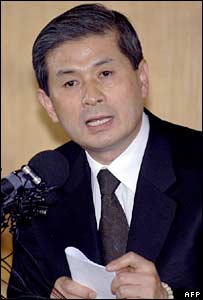Scientific progress and South Korean lesson
The prestigious collapse of expert Hwang Woo-suk and the fake human cell research work is one of the recent shocking events. This is also a lesson for Asian countries on the way to build knowledge economies.
It is possible that investment, facilities, in the long run, are not as important as an open environment, encouraging independent thinking and accepting diversity in opinion.

Hwang has been praised by the South Koreans as a national hero (Photo: BBC)
Commenting on the Financial Times today, the writer Guy de Jonquieres argues that it is not just the gray matter, infrastructure and government funding, but a culture that encourages independent, spiritual minds. healthy challenges and doubts. Thus can create a breakthrough science.
Learning about the case of Professor Hwang, it was found that he had not been subjected to peer review, but avoided criticism, thanks to the flattering press, the masses and the government admired.
Lesson for Asia
According to writer Guy de Jonquieres, South Korea is also constrained by another burden in most East Asian countries, which is "a rigid hierarchical society - often expressed in the structure of rooms. Scientific experiments - a society that values obedience and respect for power, and discourages rebellion and public criticism. "
"Plus rote learning education, and so we have an environment that is hard for freedom of thinking."
To solve this problem, South Korea and Japan have divided many research programs into units that have been set up by their own agenda.
The two countries also encourage universities to compete based on quality, not quantity, research.
In China, there are plans to upgrade the quality of universities.
This plan is putting science over art rather than art, in part because the government thinks science is less likely to encourage political debate and criticism.
But according to Guy de Jonquieres, if science is separated from the mainstream of society, it risks becoming a government tool, rather than promoting knowledge and benefits to society.
"Saying so does not mean that big plans to promote science far away in Asia will fail. But the chances of success will be greater if science is found to develop freely in a less toxic environment. guess, less reverence and more doubts, open to diversity of opinions. "
In the mid-20th century, CP Snow, a novelist and physicist at Cambridge University, argued that the key to progress and solving social problems lies in abolishing the border between " two cultures " arts and humanities.
Snow wrote: "When you think of the long and dark history of mankind, you will see the number of hideous crimes in the name of obedience occurring more than crimes on behalf of rebellion."
Guy de Jonquieres's article concludes with the phrase "Asian policymakers need to remember this word."
- ISS paves the way to welcome new supply ships
- Rare photos of Korea before being divided into two countries
- South Korea announced the successful launch of the satellite
- South Korea built a second research station in Antarctica
- The ISS Progress spacecraft
- Russian spacecraft 'resting' in the Pacific Ocean
- Secrets of Korean hackers
- Despite the incident, the supply ship still reached ISS
- South Korea: Satellite is missing immediately after launch
- Progress ship left ISS to perform experiments on orbit
- Progress transport ship docked at ISS
- MS PowerPoint - Lesson 5: Create a manual presentation slide
 Vietnam 5th Asian champion on fuel-efficient vehicles
Vietnam 5th Asian champion on fuel-efficient vehicles We can read all NASA studies completely free of charge
We can read all NASA studies completely free of charge Singer and songwriter Bob Dylan won the 2016 Nobel Prize for Literature
Singer and songwriter Bob Dylan won the 2016 Nobel Prize for Literature Scientific revolution in Asia
Scientific revolution in Asia Admire the 'living fossils' that exist around us
Admire the 'living fossils' that exist around us  Inside the Dark Rooms: A Story of Spiritualism and Science
Inside the Dark Rooms: A Story of Spiritualism and Science  American startup provides scientific eye implants for blind people
American startup provides scientific eye implants for blind people  Making 3D printed statues honoring 120 outstanding contemporary female scientists
Making 3D printed statues honoring 120 outstanding contemporary female scientists  Three Outstanding Women Scientists Awarded L'Oréal-UNESCO Awards
Three Outstanding Women Scientists Awarded L'Oréal-UNESCO Awards  A Look at the Science Behind Betting
A Look at the Science Behind Betting 